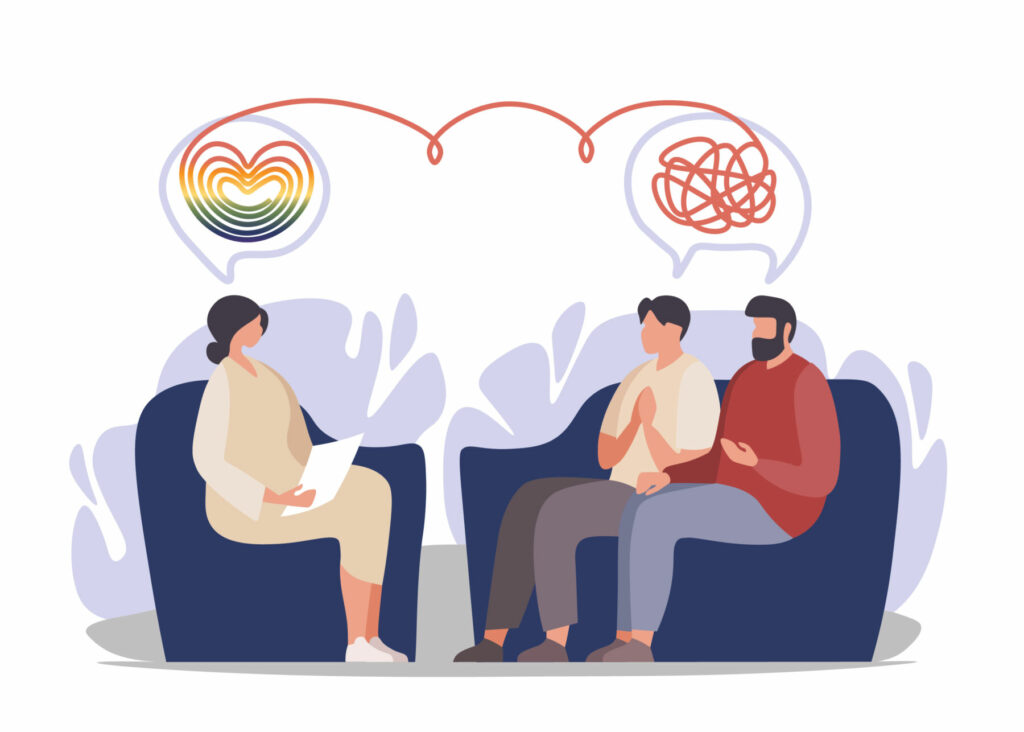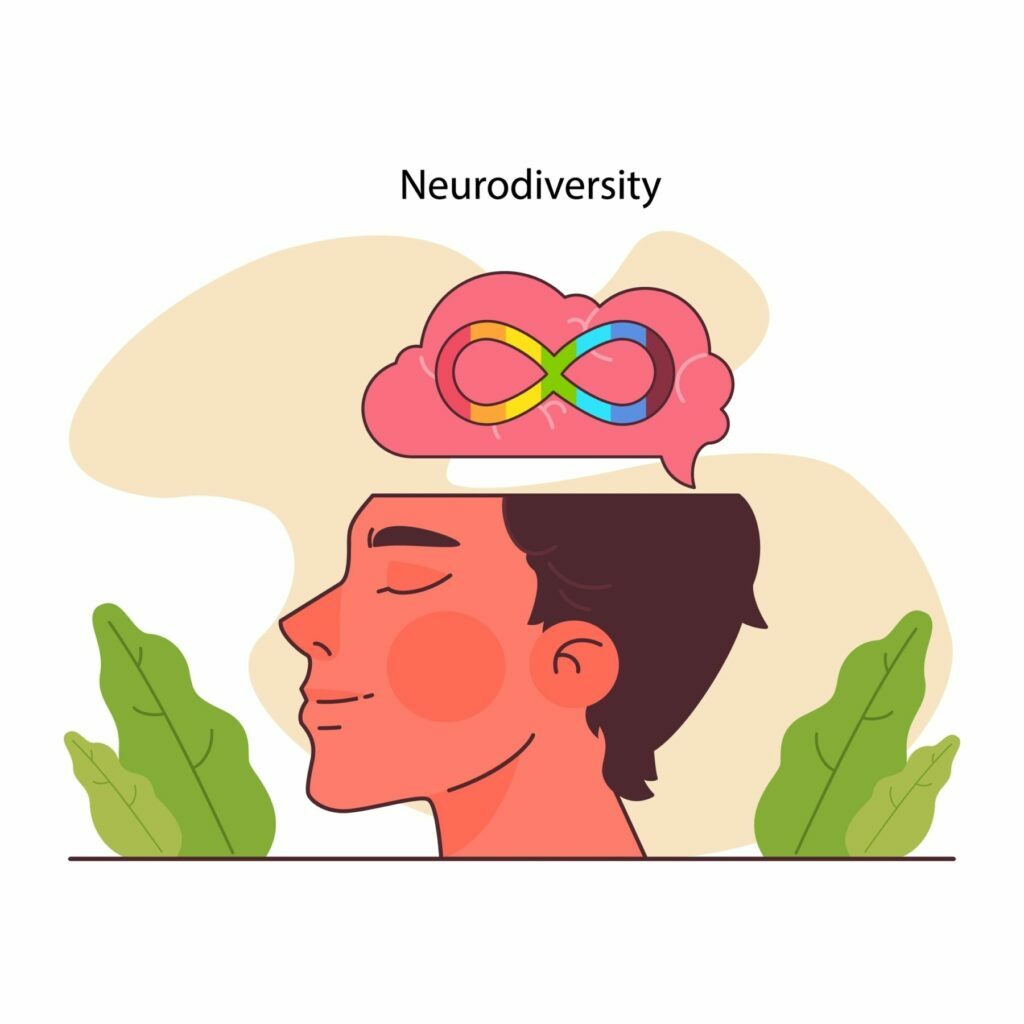Common Relationship Issues for Queer, LGBT, and Gay People

In the realm of romantic partnerships, the LGBTQ+ community faces unique challenges and joys that can be explored in LGBT couples therapy. Navigating a romantic relationship has its own set of challenges, regardless of one’s sexual orientation. However, for gay couples, there are specific issues and dynamics that can affect their relationships. While love knows no boundaries, it’s essential to address these challenges openly and seek support from queer and LGBT therapists when necessary.
Here we will explore common relationship issues that LGBTQ couples may face and how LGBT couples therapy or LGBTQ relationship therapy can be invaluable in addressing these concerns.
A quick note on language – we have taken the liberty to use the term “couples therapy” interchangeably with “relationship therapy” to capture therapy for relationships, including poly and multi-partner relationships.
While “relationship therapy” is sometimes used exclusively to capture therapy in which polycules and non-monogamous queer people are the clients, it can often be confused with individual therapy for queer people who are addressing relationship problems independently. Please interpret “couples therapy” loosely as we have intended it.
Our queer and LGBT couples therapists see these issues commonly!
- Identity and Self-Acceptance – One of the foundational issues that many gay individuals bring to their relationships is their own journey of self-acceptance and understanding of their sexual orientation. The same is true for many trans, gender non-conforming, and queer people. For some, accepting and embracing their identity can be a lifelong process. In a relationship, this can sometimes lead to feelings of insecurity and self-doubt. LGBT couples therapy can provide a safe space to explore and address these personal issues and their impact on the relationship.
- Gender Roles and Expectations – In many heterosexual relationships, traditional gender roles and expectations can influence dynamics. For gay couples, defining roles and responsibilities within the relationship can be more complex. It’s essential to have open and honest discussions about these roles and expectations to ensure that both partners feel heard and valued. Couples therapy for LGBT individuals can provide a platform for such conversations and help establish a balance that works for both partners.
- Coming Out and Family Reactions – Coming out is a significant milestone for many LGBTQ individuals, and it can continue to affect their lives even after they’ve embraced their identity. Issues related to coming out to family and friends can create stress and tension within a relationship. LGBTQ couples therapy can help couples navigate these challenges by providing guidance on managing family reactions and building a support system.
- Healthy Communication – Effective communication is vital in any relationship, but it can be especially important for queer and gay couples. Misunderstandings and miscommunications can arise due to societal stigma or assumptions about one’s partner’s experiences. LGBTQ couples therapy and queer relationship therapy can offer tools and strategies to enhance communication and foster understanding between all partners.
- Sex and Intimacy – Sex and intimacy are integral components of a romantic relationship. However, queer and LGBTQ couples may face unique challenges in this area. Issues related to sexual orientation, past experiences, and body image can impact a partner’s physical and emotional connection. LGBT couples therapy can help partners explore these issues, express their desires, and work together to build a fulfilling sexual and emotional connection.
- Codependency – Codependency can be a common issue in many relationships, regardless of sexual orientation. However, it can become more pronounced in gay couples as they may rely heavily on each other for support in a world that may not always be accepting of their identity. Couples therapy for LGBTQ individuals can assist in addressing unhealthy patterns, establishing more balanced boundaries, and promoting individual growth within the relationship.
- Life Stages – Partners may find themselves at different life stages, particularly as it relates to their identity development as gay individuals, which can lead to disparities in goals and priorities. For example, one partner may have come out and/or accepted themselves earlier, and be ready to settle down and start a family. The other partner may still be focused on career development, self-acceptance, and deeper goals around identity exploration. LGBTQ relationship therapy can help couples navigate these differences and work towards a shared vision for their future.
- Emotion Management – Emotional well-being is crucial in any relationship, and it’s no different for gay couples. The pressures and discrimination faced by the LGBTQ community can sometimes lead to heightened emotional stress. Couples therapy for LGBTQ individuals can help couples manage their emotions, reduce stress, and develop healthy coping mechanisms.
- Values and Beliefs – Differences in values and beliefs can arise in any relationship, but they may be more pronounced in gay couples, particularly if they come from different cultural or religious backgrounds. Differences in expectations and desires around polyamorous and non-monogamous relationships may sometimes further complicate discussions around values in relationships. Queer relationship therapy and LGBT couples therapy can provide a space to explore these differences and find common ground while respecting each partner’s individuality.
- Family Planning – The desire for children and family planning is an important aspect of many relationships. For gay couples and queer relationships, this may involve complex decisions such as adoption, surrogacy, or co-parenting arrangements. LGBT couples therapy can offer guidance and support in making these crucial decisions and navigating the challenges that may arise during the process.
The Role of Queer Relationship Therapy and LGBTQ Couples Therapy
LGBTQ couples therapy, or queer relationship therapy, is a valuable resource for queer and LGBT people facing these common relationship issues. Here are some of the ways in which LGBT couples therapy can be beneficial:
- Safe and Supportive Environment: LGBTQ couples therapy provides a safe space where partners can openly discuss their concerns and feelings without fear of judgment or discrimination.
- Communication Enhancement: Therapists can teach effective communication skills, helping partners better understand each other and address issues more productively.
- Conflict Resolution: Therapy can assist partners in resolving conflicts and disagreements, leading to healthier and more harmonious relationships.
- Coping Strategies: Therapists can help partners develop coping strategies for dealing with the unique stressors that can arise from being part of the LGBTQ community.
- Building Resilience: Queer relationship therapy and LGBT couples therapy can promote emotional resilience, enabling couples to face challenges with greater strength and unity.
While queer relationships and gay couples face their share of unique challenges, it’s essential to remember that love and commitment can overcome even the most significant obstacles. Seeking support through LGBT couples therapy or queer relationship therapy can be an empowering and transformative experience.
By addressing issues related to identity, gender roles, communication, and more, LGBT couples can build stronger, healthier, and more fulfilling relationships. In the journey of love, embracing your authentic self and seeking help when needed can lead to a brighter and more loving future.
This blog is made for informational and educational purposes only. It is not medical advice. The information in this blog is not intended to (1) replace a one-on-one relationship with a qualified licensed health care provider, (2) create or establish a provider-patient relationship, or (3) create a duty for us to follow up with you.



